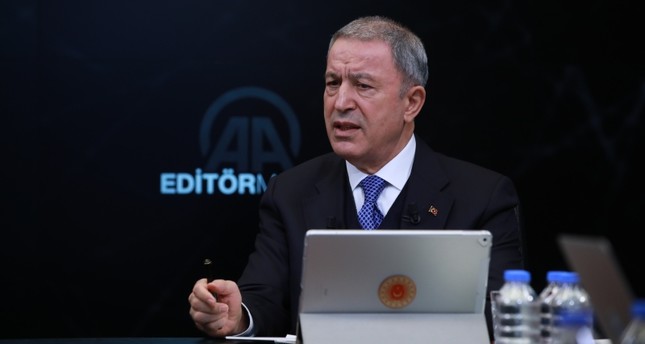
Turkey will always defend its interests, Defense Minister Akar says
by DAILY SABAH WITH AGENCIESTurkey is in favor of dialogue with regional actors when it comes to the Eastern Mediterranean, Defense Minister Hulusi Akar said Monday, adding that the country was traditionally "in favor of dialogue, negotiations and peace."
Akar said it was absurd for Greece to go to the EU each time there was a problem in the region rather than opening direct dialogue with Turkey: "This is not right. Let's sit down, have a talk, have a discussion," the defense minister said.
Underlining that no scenario in the region would be possible to put forth without Turkey's input, Akar said that since Turkey was a guarantor country for Cyprus, it had rights and responsibilities to uphold.
"We do not know what the U.K. or Greece (the other two guarantor countries) would do. However, when it comes to Turkey, we are ready to fulfill our responsibilities and protect our rights as the guarantor country. We have done what is necessary so far and will continue to do further," he said.
Turkey, as a guarantor nation for the Turkish Republic of Northern Cyprus (TRNC), is currently carrying out hydrocarbon exploration activities in the Eastern Mediterranean with two drilling vessels, Fatih and Yavuz, along with Oruç Reis and Barbaros Hayrettin Pasa seismic vessels in the same region.
Turkey has consistently contested the Greek Cypriot administration's unilateral drilling in the Eastern Mediterranean, asserting that the TRNC also has rights to the resources in the area.
The island has been divided into a Turkish Cypriot government in the northern third and Greek Cypriot administration in the south since a 1974 military coup aimed at Cyprus' annexation by Greece.
Turkey's intervention as a guarantor power in 1974 had stopped years-long persecution and violence against Turkish Cypriots by ultra-nationalist Greek Cypriots. The TRNC was founded in 1983.
Akar pointed to the prejudices of regional countries when it came to sharing the resources in the region, stating that Turkey would not allow such actions to stand.
Regarding Greece's expulsion of its Libyan ambassador over a recent maritime deal with Turkey, Akar said the move would not influence the deal's implementation.
"We suggest that Greece approaches the matter with calm, logic and wisdom, and take into consideration international law," the defense minister said, highlighting that the agreement is fully in line with international law. He noted that the deal was not signed against any neighbors, but rather to protect Libya and Turkey's rights and interests in the Eastern Mediterranean.
The defense minister also underlined that when looked at the international law, it is not hard to understand what Turkey is doing rightfully.
On Nov. 27, Turkey and Libya's Tripoli-based Government of National Accord (GNA) signed a bilateral memorandum after a meeting between President Recep Tayyip Erdoğan and GNA head Fayez Al Sarraj, took place in Istanbul. The deal enables Turkey to secure its rights in the Mediterranean while preventing any fait accompli maneuvers by other regional states.
The memorandum asserts Turkey's rights in the Eastern Mediterranean in the face of unilateral drilling attempts by the Greek Cypriot administration, clarifying that the TRNC also had rights to resources in the area.
Fellow regional actor, Greece, did not welcome the deal and even regarded it as a violation of its own rights, though international law deems otherwise. Athens later said it would expel its Libyan envoy Mohamed Younis AB Menfi from the country in response.
Recalling the historical and cultural bonds between Turkey and Libya, Akar stated that the deal had not come out of nowhere. According to the defense minister, the deal was being discussed as far back as the early 2010s, when Erdoğan was prime minister, yet progress was interrupted due to domestic issues in Libya. However, he said that the issue was put back on the table again in 2018, with negotiations having followed.
Libya has remained dogged by turmoil since 2011 when a NATO-backed uprising led to the ousting from office and death of former president Moammar Gadhafi after more than four decades in power.
Since then, Libya's stark political divisions have yielded two rival seats of power, one in Tobruk and another in Tripoli, as well as in-fighting by a host of heavily-armed militia groups.
Vice President Fuat Oktay also touched upon the issue on Monday, underlining that the drilling activities of Turkey will continue in the region. Oktay reminded that Turkey's drilling vessels, Fatih and Yavuz, have continued their drilling activities in the Eastern Mediterranean.
"We will continue to follow an active strategy in oil and natural gas explorations while drilling five more wells with our national vessels [in the Eastern Mediterranean]," Oktay said.
He added: "Turkey will not make any concessions for its rights neither in Cyprus nor in the Aegean or in the Eastern Mediterranean."
Oktay stressed that the UN, EU and NATO have not fulfilled their responsibilities for Turkey, while Turkey has been affected from uncertainties in the region.
EU weighs response to Turkey-Libya deal
Meanwhile, European Union foreign ministers debated Monday how to respond to the deal between Turkey and Libya. Before chairing the meeting, new EU foreign policy chief Josep Borrell said it was "not a matter of 'sanctions today,'" urging ministers to study the deal.
Austrian Foreign Minister Alexander Schallenberg said "it's a little bit astounding how they split up the Mediterranean among themselves. We'll have to see how to deal with it." Meanwhile, Dutch Foreign Minister Stef Blok responded that "The Netherlands is always a staunch supporter of the rule of international law, and we side with Greece ... International law should be upheld."